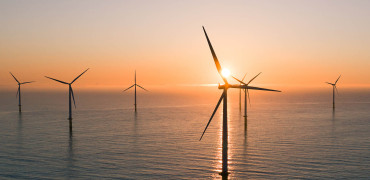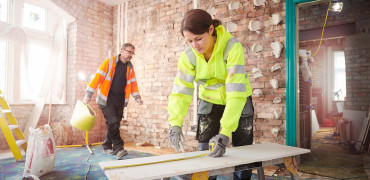Although his announcement was somewhat confusing as to whether it was a full ‘roll back’ or simply a slight dilution, Rishi Sunak has certainly revealed himself to be less courageous than many have hoped in flying the flag for low carbon heating.
Last month, in an unusual, televised address direct to the public rather than Parliament, he painted himself as protecting the poorest households by delaying the heat pump rollout.
The likely impact is somewhat obscured by the good news of increasing Boiler Upgrade Scheme grants for air and ground source heat pumps from £5K to £7,500, but also confirmed that the ban on sales of new gas boilers will now not be until 2035, and even then people will not be forced to replace them.
Homeowners will not have to switch as had previously been thought, until the time comes to replace their boilers.
And poorer households “will never have to switch at all,” said Sunak, although what that threshold is remains to be seen.
65% of homeowners felt that current government financial incentives didn’t go far enough
A confusing climb-down
This is a climb-down, because the original plan was a phasing out of new gas boilers from 2025, and a complete ban in 2033.
However it’s a confusing one, because the Government has reaffirmed the pledge to industry to install 600,000 heat pumps per year by 2028 in a briefing paper, although around a fifth of households are now not required to get rid of their gas boilers.
And Labour have confirmed that if they get into power, they will adopt the diluted targets as theirs too.
This all feeds into the overall issue which is aspirations versus the mechanics of making them a reality, or even getting near it.
A mixed reaction
The industry has given a mixed reaction to Rishi’s lukewarm remarks on heat pumps, to say the least – the Chartered Institute of Building’s policy director Eddie Tuttle said that with decarbonising homes being “vital” to reach net zero, “it’s disappointing to hear the Prime Minister scaling back energy efficiency targets and the commitments made in the Government’s own net zero growth plan published only six months ago, which refers to minimising reliance on fossil fuels.”
He added that The Office for Budget Responsibility has concluded that a “late and abrupt transition to net zero would cost more, and that “continued dependence on gas could be as expensive fiscally as completing the transition to net zero.
“To deprioritise this issue is baffling when the government should instead be finding ways to support homeowners to retrofit their properties and improve their energy efficiency for the lowest possible cost.”
He said the The Boiler Upgrade Scheme has had “very low take up” and increasing the grant will make “little difference, as the remaining cost will still be unaffordable for many households amidst a cost of living crisis.”
A lack of clarity
Heating installers’ body MCS gave a warm welcome to the increase in grant – CEO, Ian Rippin, said: “More people will now have the confidence and ability to invest in low-carbon heating.”
However, he was disappointed by the pushing back of banning gas boiler installations until 2035, as it created a lack of clarity in consumers’ minds: “The most important element of helping consumers make the right, informed, green choice is clarity and moving the goalposts now risks confusing homeowners about what the right thing to do is.”
The announcements came shortly before the Government confirmed it was opening a new gas field in the North Sea, so clearly it is remaining committed to some fossil fuel base for the UK’s energy needs, despite what environmentalists claim as the irreversible risks.
Over-reliance of fossil fuel
Stew Horne, head of policy at Energy Saving Trust was dismayed at this news, including for consumers facing high energy costs: “Our over-reliance on fossil fuels for heat and power is the root cause of the high cost of energy.”
He said that other nations were now “leading the way in implementing policies that cut costs and carbon emissions simultaneously whilst increasing energy security,” while the UK was arguably leading on the issue in the early part of this century.
The Government’s own Climate Change Committee attacked Sunak’s proposals, prompting a defensive statement from the PM: “They should explain to the country why they think it’s right that ordinary families up and down the country should fork out five, 10, £15,000?”
The Government also pushed journalists to ask Labour if they would change the approach, leading to allegations of ‘politicising climate change’ from the CCC, partly because Sunak had been attacking the Committee directly, and leveraging public economic concerns in order to do so.
Public awareness
The public largely remain in the dark about the plans, regardless of the Government’s worries pre-Election.
According to a survey by MyBuilder.com, half of homeowners are “confused by the government’s plans to phase out old boilers, and more than 70 per cent don’t understand the cost of upgrading to a new approved system.”
48 per cent of surveyed homeowners “didn’t know if the ban affected them and their homes, two-thirds (65 per cent) felt that current government financial incentives didn’t go far enough.
On top of this, 71 per cent had no idea how much a sustainable boiler system would cost them - and a staggering 61 per cent admitted to not even knowing what a heat pump is.
So, what’s next?
Will the energy companies push forward their own incentives for heat pump adoption, based on public interest and their own desire to decarbonise?
Or will they be forced by shareholders to bolster their fossil fuels-based sales until 2035 comes around?
If they are not coerced to change tack in favour of heat pumps, there is a chance that will be too late to make a significant dent in our emissions as a nation.
The issue of domestic space heating, alongside housebuilding targets, is going to be the ultimate hot potato at next year’s General Election.
Cutting carbon may now be a popular goal shared by votes on both sides of the spectrum, but the popular large-scale solutions have yet to be found.
James Parker is editor of Housebuilder and Developer




